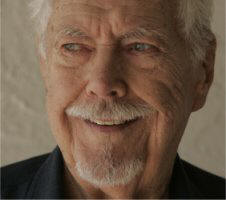|
In Remembrance: Robert Altman
Born on February 20, 1925 in Kansas City, MO, he served in the Army Air Forces during World War II where he flew 46 bombing missions out of a base in the Dutch East Indies. After the war, Altman drifted through a series of jobs in Los Angeles before a brief tenure as a contract player at 20th Century Fox, although he never received more than extra work. He tried his hand at writing, collaborating on the screenplay for the 1948 Lawrence Tierney crime drama Bodyguard.
Disillusioned with Hollywood, Altman moved back to Kansas City where he got a job directing industrial training films. In 1957 Altman wrote and directed the independent feature The Delinquents and also co-directed the documentary The James Dean Story. The Delinquents caught the eye of director Alfred Hitchcock whom brought Altman back to Hollywood to direct episodes of his Alfred Hitchcock Presents television series. For the next ten years Altman worked steadily in television on such series as Peter Gunn, The Millionaire, Maverick, Surfside 6, Bonanza, Route 66 and Combat. Towards the end of the 60s, he began to work in feature films with the science-fiction thriller Countdown (1968) and the drama That Cold Day In The Park (1969).
However, it was Altman’s third film, the satiric dark comedy M*A*S*H, that would make critics take notice of his work. Although an attack on the United States’ involvement in Vietnam, none of the doctors in the mobile army hospital in which the film is set ever mention what war they are participating in. A nervous 20th Century Fox forced Altman to place a notice at the beginning of the film stating its setting during the decade earlier Korean War.
M*A*S*H also showcased many of the elements that quickly became recognized as Altman’s style- large ensemble casts, overlapping dialogue and scenes shot in long takes with the camera moving back and forth amongst the action.
Altman followed up M*A*S*H with several films in quick order including his deconstruction of the Western hero in McCabe And Mrs. Miller (1971), the Raymond Chandler adaptation The Long Goodbye (1973) and the gambling comedy California Split (1974). His next big hit would be his examination of the country music industry Nashville for which he would receive a Best Picture Academy Award nomination for producing the film and a second Oscar nomination for Best Director.
Following the critical zenith of Nashville, the next several of Altman’s films met with disappointing critical and commercial reception. By the time of his 1980 musical comic-strip adaptation Popeye, Altman and his work had fallen out of favor with the critics. He relocated to New York where he worked directing mostly stage productions and made-for-television movies with only the occasional feature film.
In 1988 Altman’s career began to rebound with the political satire miniseries Tanner ’88 which he co-created for cable service HBO with “Doonesbury” cartoonist Gary Trudeau. He followed its success in 1990 with the feature Vincent & Theo, which explored the relationship between painter Vincent Van Gogh and his patron brother.
Altman’s next film was The Player, a satire on the motion-picture business. Adapted from the novel by Michael Tolkin, the film told the story of a powerful studio head trying to cover-up his accidental murder of a struggling screenwriter. To achieve an authentic portrayal of current-day Hollywood, Altman was able to use his reputation for treating actors well to entice more than 60 celebrities including Cher, Jack Lemmon, Lily Tomlin and Bruce Willis to work for scale playing themselves in cameos. The film was a hit with critics and would earn Altman his third Best Director Academy Award nomination. He would earn a fourth nomination the following year for his ensemble character study Short Cuts.
After a string of commercial and critical failures – The Gingerbread Man (1998), Cookie’s Fortune (1999) and Dr. T & The Women (2000) – Altman rebounded with Gosford Park (2001), which juxtaposed a drawing-room murder mystery plot against a satire on the English class system of the 1930s. The film would go on to be Altman’s biggest box-office success since M*A*S*H. It would also earn a total of seven Academy Award nominations including Altman’s fifth nod for Best Director.
With his Oscar nomination for Gosford Park, Altman tied with directors Alfred Hitchcock, Martin Scorsese, Clarence Brown and King Vidor in being nominated the most times for directing without actually winning a regular Oscar. He was awarded an honorary Oscar for lifetime achievement earlier this year.
Altman’s final film was A Prairie Home Companion which was released this past spring and was based loosely on the popular public radio series hosted by Garrison Keillor. |
 Robert Altman, the
maverick filmmaker behind such classics as M*A*S*H (1970) and
Nashville (1975), has passed away on November 20, 2006 in Los
Angeles, CA. He was 81.
Robert Altman, the
maverick filmmaker behind such classics as M*A*S*H (1970) and
Nashville (1975), has passed away on November 20, 2006 in Los
Angeles, CA. He was 81.